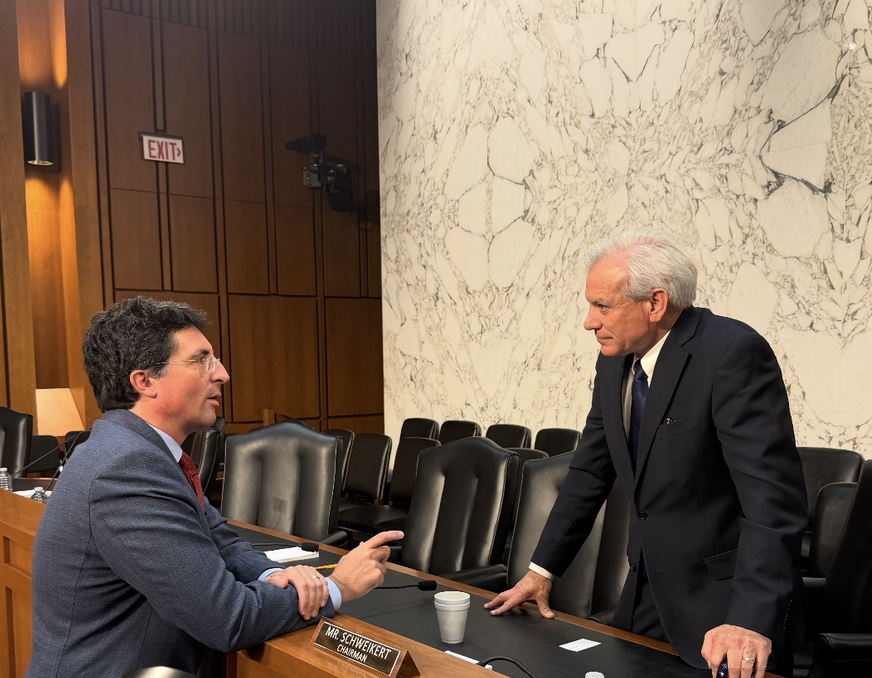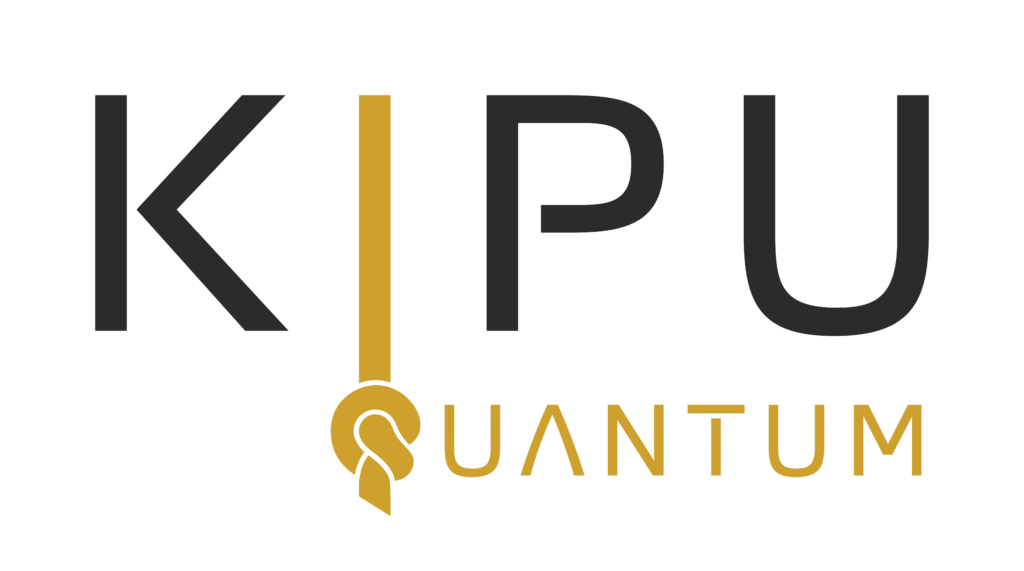Insider Brief
- IonQ CEO Niccolò de Masi told Congress that quantum technology is advancing into a commercially relevant phase and will shape economic competitiveness.
- Lawmakers emphasized Tennessee’s growing quantum ecosystem, including Chattanooga’s commercial quantum network and partnerships with Oak Ridge National Laboratory.
- De Masi said IonQ’s high-fidelity systems are already compressing months of classical computation into a day, with further gains expected as workloads shift to quantum machines.
- Image: IonQ chief executive Niccolò de Masi, left, meets with Rep. David Schweikert R-AZ during the Joint Economic Committee session on frontier technology.
Quantum computing’s commercial moment has arrived, IonQ chief executive Niccolò de Masi told lawmakers in his congressional testimony that the technology is advancing fast enough to shift economic power, industrial capacity and national security planning.
De Masi’s message reinforced the idea that quantum systems are starting to solve problems classical machines cannot, he said, and countries that move slowly risk missing an industry being built “from scratch” in the mid-2020s.
According to de Masi, the U.S. now faces a window to secure leadership in quantum computing, networking and sensing. He said momentum has accelerated as high-fidelity quantum machines become capable of turning months of classical computation into days, with further gains expected.

“The opportunity for value capture is moving,” said de Masi. “We believe at the pace that IonQ is leading the quantum computing, networking and sensing space is to be very much be about software and applications and how you capture value in solving problems that can never be solved with classical computers.”
He added, “So, we’re creating a brand new industry will drive economic growth at the state and nationwide level, and it’s being created effectively from scratch.”
The testimony came during a hearing before the Joint Economic Committee, chaired by Rep. David Schweikert R-AZ, with Vice Chair Sen. Marsha Blackburn, R-Tenn., spotlighting Tennessee’s growing role as a quantum hub. Blackburn emphasized Chattanooga’s new commercial quantum network and the state’s partnership with Oak Ridge National Laboratory and IonQ.
“IonQ is important to us in Tennessee, and we are looking forward to great things there.” said Blackburn. “Tennessee is a great tech state. Chattanooga is becoming a tech hub, and we’re thrilled with what we see happening there.”
She said and she is continuing her work to restart the Senate’s quantum initiative, suggesting that that federal-state collaboration will be essential in continuing these projects as quantum transitions from research into applications.
Applications Drive the Value
Blackburn pressed de Masi on why “quantum sandboxes” — test environments for near-term applications — could accelerate commercial uptake.
De Masi said the U.S. should understand where economic value will emerge first. According to his testimony, the shift underway mirrors earlier technology cycles: once hardware stabilizes, the next wave of growth comes from software and applications.
He said IonQ’s model revolves around enabling developers to solve problems infeasible for standalone classical computers and create an entirely new class of economic activity. These applications include drug discovery, financial modeling, supply-chain prediction, predictive maintenance and defense-related optimization. As quantum networks mature, he added, data transmitted between systems could gain inherent security protections not possible with classical cryptography.
Tennessee as a Pilot Model
According to de Masi, these partnerships — like the Oak Ridge and EPB in Chattanooga collaborations — demonstrate how states can build durable ecosystems around next-generation computing.
He said early-stage federal funding remains essential even as industry spending dominates total R&D. The Oak Ridge partnership, he testified, is an example of a national lab enabling breakthroughs unlikely to occur in the private sector alone. Chattanooga’s commercial quantum network, he said, provides a real-world environment to link quantum hardware, quantum networks and quantum sensing technologies into a single platform.
“Nine out of ten dollars spent on R&D are coming from the private sector, but that one out of ten is really important for sparking progress, particularly in early-stage projects,” said de Masi.
De Masi also suggested that work is extending quantum capabilities into “all theaters,” likely including terrestrial networks and space-based systems with the goal to enable quantum-secure communications and distributed quantum computing with national-security relevance.
U.S. Competitiveness and the Mid-2020s Inflection
Committee Chairman Schweikert pressed de Masi on noise suppression, computational precision and readiness to handle large-scale scientific workloads such as synthetic genome modeling. De Masi responded that IonQ’s trapped-ion systems provide high fidelity that can support real workloads now.
“IonQ has the world’s most precise and high-fidelity physical qubits,” said de Masi. “We have four nines of fidelity — 99.99% — That means we don’t actually have a lot of errors to correct.”
According to de Masi, quantum is not a far-future technology in need of theoretical validation but a commercial tool solving problems today. He said growth in the mid-2020s will be defined by the expanding share of workflows that quantum machines absorb. Over time, he added, more of the task will shift from classical processors to quantum systems because of energy efficiency, cost advantages and the ability to solve computation previously deemed impossible.
Schweikert’s questions on biological modeling highlighted a recurring theme: where classical systems hit limits, quantum systems may unlock entire industries.
De Masi told lawmakers the company has already cut classical tasks from a month to a day in partnership with Nvidia, AstraZeneca and Amazon Web Services, and expects the same pattern to extend to problems that currently take years or centuries of computation.
De Masi also pointed to energy demand as a strategic consideration. According to his testimony, quantum machines require “very little power” relative to classical AI systems, which could make them attractive for large-scale workloads as power constraints tighten across U.S. data centers.
He said quantum systems may also contribute to grid optimization, an area IonQ is exploring with Oak Ridge.
Schweikert added that analysts expect a rapid approach toward a “major breakthrough,” signaling bipartisan recognition that the U.S. must prepare for a transition that could reshape industrial processes, national security and scientific research.
De Masi testified that it’s a mission that IonQ is focused on.
“As our machines get more powerful, we’re taking down more and more of the workflow,” said de Masi. “At the moment, as we’ve demonstrated with Nvidia, AstraZeneca, Amazon Web Services, we can turn a month of classical computation work on some genome problem problems, quantum chemistry problems into a day. Soon it’ll be a year of work, and eventually it’ll be a century of work into a day.”















